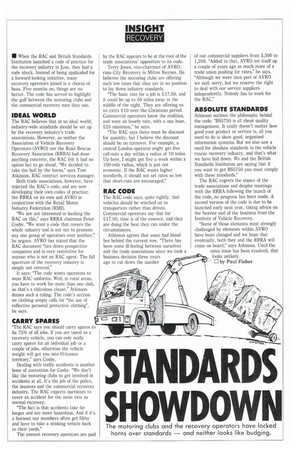INSIGHT
Page 28

If you've noticed an error in this article please click here to report it so we can fix it.
RECOVERY
• When the RAC and British Standards Institution launched a code of practice for the recovery industry in June, they had a rude shock. Instead of being applauded for a forward-looking initiative, many recovery operators joined in a chorus of boos. Five months on, things are no better. The code has served to highlight the gulf between the motoring clubs and the commercial recovery men they use.
IDEAL WORLD
The RAC believes that in an ideal world, industry-wide standards should be set up by the recovery industry's trade associations. However, as neither the Association of Vehicle Recovery Operators (AVRO) nor the Road Rescue Recovery Association (RRRA) had done anything concrete, the RAC felt it had no option but to go ahead. "We decided to take the bull by the horns," says Toni Atkinson, RAC contract services manager.
Both trade associations, however, have rejected the RAC's code, and are now developing their own codes of practice; the RRRA on its own and AVRO in conjunction with the Retail Motor Industry Federation (RMI).
"We are not interested in backing the RAC on this," says RRRA chairman Peter Cosby. "We want a code that covers the whole industry and is not out to promote any one group of operators over another," he argues. AVRO has stated that the RAC document "ties down prospective companies and is very restrictive for anyone who is not an RAC agent. The full spectrum of the recovery industry is simply not covered."
It says: "The code wants operators to wear RAC uniforms. Well, in rural areas, you have to work for more than one club, so that's a ridiculous clause." Atkinson denies such a ruling. The code's section on clothing simply calls for "the use of reflective personal protective clothing", he says.
CARRY SPARES
"The RAC says you should carry spares to fix 75% of all jobs. If you are taxed as a recovery vehicle, you can only really carry spares for an individual job or a couple of jobs, otherwise the vehicle weight will get you into 0-licence territory," says Cosby.
Dealing with traffic accidents is another bone of contention for Cosby. "We don't like the motoring clubs to get involved in accidents at all. It's the job of the police, the insurers and the commercial recovery industry. The RAC expects operators to cover an accident for the same rate as normal recovery.
"The fact is that accidents take far longer and are more hazardous. And if it's a burnout our members often get filthy and have to take a stinking vehicle back to their yards."
The amount recovery operators are paid by the RAC appears to be at the root of the trade associations' opposition to its code.
Terry Jones, vice-chairman of AVRO, runs City Recovery in Milton Keynes. He believes the motoring clubs are offering such low rates that they are in no position to lay down industry standards.
"The basic rate for a job is £17.50, and it could be up to 50 miles away in the middle of the night. They are offering us an extra £10 over the Christmas period. Commercial operators know the realities, and want an hourly rate, with a one hour, £25 minimum," he says.
"The RAC says there must be discount for quantity, but I believe the discount should be on turnover. For example, a central London operator might get five call-outs a day within a radius of 10 miles. Up here, I might get five a week within a 100-mile radius, which is just not economic. If the RAC wants higher standards, it should not set rates so low that short-cuts are encouraged."
RAC CODE
The RAC code says, quite rightly, that vehicles should be winched on to transporters rather than driven. Commercial operators say that for £17.50, time is of the essence, and they are doing the best they can under the circumstances.
Atkinson agrees that some bad blood lies behind the current row. "There has been some ill-feeling between ourselves and the trade associations since we took a business decision three years ago to cut down the number of our commercial suppliers from 3,500 to 1,200. "Added to that, AVRO set itself up a couple of years ago as much more of a trade union pushing for rates," he says. "Although we were then part of AVRO we said, sorry, but we reserve the right to deal with our service suppliers independently. Nobody has to work for the RAC."
ABSOLUTE STANDARDS
Atkinson outlines the philosophy behind the code: "BS5750 is all about quality management. It really doesn't matter how good your product or service is, all you need to do is show good, organised information systems. But we also saw a need for absolute standards in the vehicle rescue recovery industry, and that's what we have laid down. We and the British Standards Institution are saying that if you want to get B55750 you must comply with these standards."
The RAC regrets the stance of the trade associations and despite meetings with the RRRA following the launch of the code, no progress has been made. A second version of the code is due to be launched early next year, taking advice on the heavier end of the business from the Institute of Vehicle Recovery.
"Some of those elements most strongly challenged by elements within AVRO have been changed and we hope that eventually, both they and the RRRA will come on board," says Atkinson. Until the rates issue has been resolved, that looks unlikely.
fl by Paul Fisher
















































































